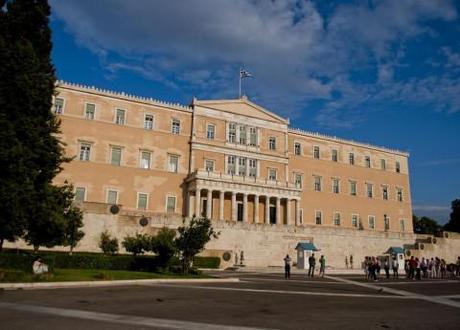
Greek Parliament: Greeks head to the polls this weekend. photo: Kokotron
This weekend, France and Greece both go to the polls to determine their future, and possibly the future of the EU.
In France, it is now very likely that François Hollande will win the second round of the presidential elections. This is because, despite a sudden lurch to the right by incumbent Nicholas Sarkozy in a last ditch attempt to capture the almost 20 percent of French people who voted National Front, Marine Le Pen’s refusal to support him is all but an endorsement for the socialist candidate. Although Hollande is said to be a somewhat indecisive character, his stated anti-austerity stance may well bring him into conflict with German Chancellor Angela Merkel, and probably increases the risks not only to the French economy but also to the continued existence of the eurozone.
Greece is lauded as the birthplace of “democracy”, but lest we forget, “oligarchy” and “tyranny” are also Greek in origin.
In Greece, the situation is far more complicated. This small country has a long and distinguished history as a crucible for political experimentation. It is lauded as the birthplace of “democracy”, but lest we forget, less popular political terms such as “oligarchy” and “tyranny” are also Greek in origin. In modern times, the Greek Civil War in the 1940s can be seen as the first great conflict of the Cold War. Subsequently, the country experienced a right-wing military junta, and today the Greek Communist party (KKE) still commands a loyal following, largely for nostalgic reasons linked to its suppression by the Colonels.
Today, the mismanagement of the economy by the centre-left (PASOK) and centre-right (New Democracy) parties that have ruled for the last 30 years have once again led to a surge in support for political extremism. The sheer profusion of parties that will probably win seats in the next parliament is bewildering, as are their policies. Only one thing is clear: Extreme parties, whether to the right or left, have much more in common with each other that with the mainstream center.
The two camps are broadly divided on the issue of the memorandum for dealing with the national debt signed in February between Greece and the Troika of EU, ECB and IMF. This is because opinion polls show that, while over 75 percent of Greeks are in favour of retaining the euro, more than 60 percent are against the austerity measures that such a course would seem to imply.
PASOK and New Democracy, which signed the memorandum, are in favour of honouring it. Most other parties are against the austerity measures that the memorandum demands. The biggest threat comes from what appears to be a nascent coalition between the far-left SYRIZA party and the new far-right “Independent Greeks” party. Both call for the abolishing of “illegal” austerity measures imposed by sinister and usurious foreign powers, and for a renegotiation with the troika (the International Monetary Fund, European Union and European Central Bank) from a position of strength. Absurdly, this “position of strength” appears to be based around a demand from Germany for the payment of WWII reparations. It is a measure of the desperation of the Greek people that any are prepared to believe that this has a realistic chance of working.
Extreme parties, whether to the right or left, have much more in common with each other that with the mainstream center.
The fact that one of these parties purports to be socialist, and the other nationalist, does not seem to be causing great concern. So desperate has the plight of the Greek people become that it is estimated that 5 percent or so may even vote for the neo-Nazi “Golden Dawn” party, whose manifesto seems to have but one core element, the expulsion of all legal and illegal immigrants (or at least the non-European ones). And this despite the fact that the mainstream parties have addressed xenophobic sentiment in ways that would scarcely have been believable a few years ago, creating concentration camps for immigrants and vowing to build a wall along the Greco-Turkish border. More and more, the political situation in Greece is beginning to resemble a microcosm of Europe in 1930s. Could this be an early warning sign of things to come throughout the continent?

